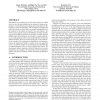Free Online Productivity Tools
i2Speak
i2Symbol
i2OCR
iTex2Img
iWeb2Print
iWeb2Shot
i2Type
iPdf2Split
iPdf2Merge
i2Bopomofo
i2Arabic
i2Style
i2Image
i2PDF
iLatex2Rtf
Sci2ools
118
click to vote
EDBT
2010
ACM
2010
ACM
Probabilistic ranking over relations
Probabilistic top-k ranking queries have been extensively studied due to the fact that data obtained can be uncertain in many real applications. A probabilistic top-k ranking query ranks objects by the interplay of score and probability, with an implicit assumption that both scores based on which objects are ranked and probabilities of the existence of the objects are stored in the same relation. We observe that in general scores and probabilities are highly possible to be stored in different relations, for example, in column-oriented DBMSs and in data warehouses. In this paper we study probabilistic top-k ranking queries when scores and probabilities are stored in different relations. We focus on reducing the join cost in probabilistic top-k ranking. We investigate two probabilistic score functions, discuss the upper/lower bounds in random access and sequential access, and provide insights on the advantages and disadvantages of random/sequential access in terms of upper/lower bounds....
Related Content
| Added | 02 Sep 2010 |
| Updated | 02 Sep 2010 |
| Type | Conference |
| Year | 2010 |
| Where | EDBT |
| Authors | Lijun Chang, Jeffrey Xu Yu, Lu Qin, Xuemin Lin |
Comments (0)

